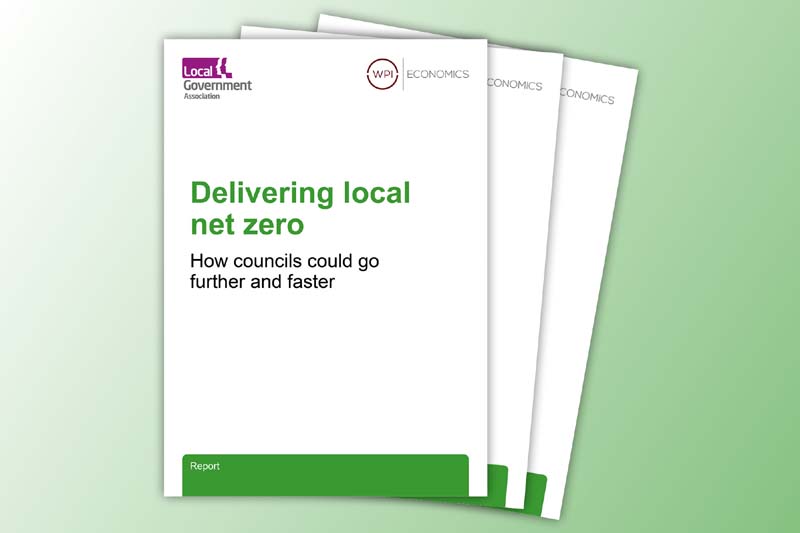
The Local Government Association has outlined a “revolutionary new plan” which outlines how over 1,000 homes a day could be retrofitted with low-carbon efficiency measures by councils by 2030 – reducing energy bills by nearly £700 million – with the right investment and support.
Councils, the LGA argues, are a “unique and powerful partner in achieving net zero”, able to impact on more than a third of all emissions from villages, towns and cities, such as through housing, transport and the natural environment. And ahead of the COP26 summit in Glasgow starting at the end of the month, the new report commissioned by the LGA – Delivering local net zero – sets out the case for why councils are best-placed to deliver green infrastructure projects in local communities, which would support the Government’s ambition to level up, build back better and tackle the climate emergency.
The report focusses on the 2.9 million fuel poor homes and additional 600,000 council housing that require retrofitting to achieve the energy efficiency rating EPC C. The LGA is calling on the Government to use next week’s Spending Review to begin work with councils and businesses on a national fiscal and policy framework to address the climate emergency.
With the right powers and investment of £12.2 billion by 2030, the LGA report sets out how councils can:
Retrofit 3.49 million homes with energy efficiency measures by 2030, 2.34 million more than under the current plan – amounting to on average 1,017 homes retrofitted each day that would save £698 million per year from energy bills;
Create the warmer and comfortable homes and buildings that would reduce costs to the NHS by £1.9 billion every year;
Support almost 31,000 new, skilled jobs in the construction and retrofitting industries.
The LGA said the Spending Review and COP26 summit should mark the beginning of a new climate change partnership between central and local government, and see a new approach to investment that gives councils the long-term funding to decarbonise building stock, reduce greenhouse gas emissions from transport and deliver clean energy projects.
In order to safely meet the Committee on Climate Change’s balanced pathway to net zero, further investment is needed to help councils shift 1.5 billion journeys from cars to walking or cycling in England by 2030. In addition, councils are key to delivering clean energy projects through the planning system, and so having the resource and capability to continue the provision of renewable energy and heat networks will be fundamental to meeting net zero.
Following the Government’s announcement on reducing carbon emissions from heating homes and other buildings, as part of a wider government strategy to achieve net zero, Cllr David Renard, LGA environment spokesperson, said: “Climate change requires significant international, national, and local leadership, but only councils can mobilise and join-up the collective action in the places people live their lives and where businesses do their business.
“This report sets out the significant strides we can take to reducing carbon emissions with the right investment and resources for councils in the Spending Review, which would also save millions on energy bills for households and businesses. From decarbonising building stock, reducing the number of car journeys and delivering clean energy projects, councils have influence over a third of emissions from their areas and have a pivotal role to play in addressing the climate emergency.”
Case studies: How councils are taking local action to reduce carbon emissions
Leeds City Council currently has one of the largest local authority fleets with 380 electric vehicles (EVs), 45 of which are being used by local businesses as part of an EV Trials Scheme to encourage wider uptake. After taking part in the Trials scheme, 50% of organisations have told the council that they’re now considering switching to zero emission vehicles.
North Somerset Council plans to rewild as much of its land as possible, following a public consultation held in 2019/20, creating new habitats and enabling wildlife to thrive.
Lancaster City Council declared a Climate Emergency in January 2019, at which point the Local Plan had been submitted and it was not possible to be significantly amended. The Local Plan was adopted in July 2020, and the Council immediately entered a Climate Emergency partial review to ensure that climate change mitigation and adaptation become fundamental to placemaking in the District. Following a scoping consultation, 32 policies were highlighted for review, improvement, and strengthening. The policies encompass the themes of sustainable design, energy efficiency and renewable energy, sustainable transport, green and blue infrastructure, heritage, and water management.
City of York Council is delivering a new build housing programme with all homes built to achieve zero carbon in use. The homes in the programme will be built to Passivhaus certification, ensuring high thermal efficiency. The first homes will be complete in 2022.









